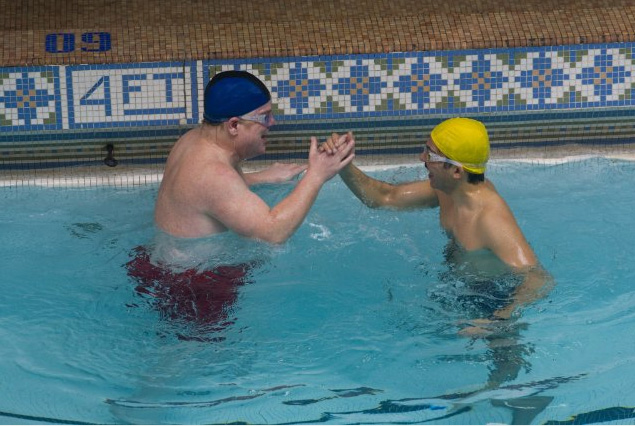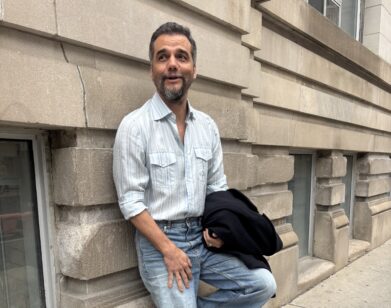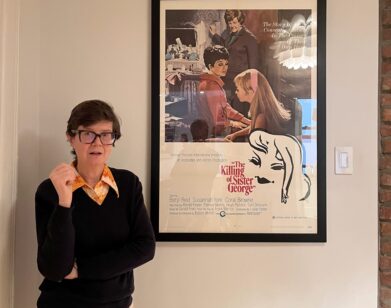John Ortiz Goes from Stage to Screen

HOFFMAN AND ORTIZ IN JACK GOES BOATING
Set against the bleak backdrop of a New York winter, Jack Goes Boating tells the story of three relationships in various stages of disarray. Originally a play written by Robert Glaudini, the film manages to evade the normal pitfalls of stage-to-screen transition–there are no mangled monologues or claustrophobic sets here. Instead, first-time director Phillip Seymour Hoffman shows restraint by letting the camera linger on uncomfortably quiet moments. The result is a rich, if mostly quiet, story of four people coming together and breaking apart. Featuring much of the original stage cast, the movie includes performances from a blissfully funny Amy Ryan, Daphne Rubin-Vega, and Hoffman himself. But the project’s center is Clyde, played by John Ortiz, who manages to find the humor in the wreckage of his marriage. Ortiz made a name for himself with decades of work on stage, and co-founded the LABrynith theatre company in 1992, where he met Hoffman two years later. We caught up with him in Toronto, where Jack Goes Boating recently opened the festival there, and got him to talk about shooting in his hometown.
MOHNEY: Can you talk a bit about how you got involved with the play, and how the play became a movie?
ORTIZ: I’m one of the co-founders of LAByrinth Theater Company, and Phil joined us two years later, and we became co-artistic directors of the company for about 10 years…Robert Glaudini wrote this play, and was really excited about by it, and he got Phil and me and Daphne Rubin-Vega in mind to play those parts, and we read it for the company, and they loved it, and we decided to produce it, and it was quite successful. And, you know, the transition into the film was quite seamless. One of the reasons was because the play was very cinematic in structure…The story is a simple story in terms of plot, and in terms of life, and it being real. You know these are real people, going through real stuff. The transition was actually quite organic, and we kept a lot of the people who were involved in the play in the film. We weren’t like hired guns from Hollywood or something, being like: “Let’s make this into a shoot ’em up, blow ’em up movie.”
MOHNEY: Where you ever worried about anything getting lost in translation to the screen from the stage, or do you think that the film enhanced the story?
ORTIZ: No, no, no, we didn’t [worry]. Because everyone involved was involved in the play. We just spent more time with these people, we got to know them more. And when we did the film, we got that great luxury to revisit it. It’s like marinating meat, you know? The longer it’s sitting there, the juicier it’s going to get. It got juicier, it got richer, and technically speaking, we got definitely more into the psyche of these characters, with film. And I think film gave us that luxury…You don’t see them as leads, you don’t see them as heroes. So it’s great, to get to spend time with people like that. To see a driver for a few seconds of silence, and for him to not be in the background. Making the movie definitely allowed us to explore that more, to get into the characters’ minds more.
MOHNEY: You’ve known Phillip for a long time, and worked on this play for a long time. Was it a little bit odd, to be directed by someone who’s not just a friend, but a peer, and someone that you’re working on a scene with?
ORTIZ: It was actually my idea. One of our main missions in the theater company is to do things that normally you wouldn’t do, and to live outside of the comfort zone–and to do it because you have that support there. So a little bit of that fear factor goes out the window. So when I asked him, it just seemed like a natural extension of that. And to be honest with you, it was because he’s pretty great at it. He’s one of my favorite directors to work with. We’re able to put stuff aside–and when we have a job to do, we do it. It’s not like, “Oh, we’re best friends and we’re doing this together.” No, we’re workers, and let’s figure this out together. But knowing each other in that way for so long definitely helped us in a lot of moments in this film. And most of those things where we’re in silence, and I think people see that. And that energy between us, which I guess people call chemistry.
MOHNEY: You guys have great chemistry.
ORTIZ: [Laughs] Yeah, there’s definitely love there.
MOHNEY: I think this movie’s great, because it’s really three romantic relationships, with the friendship, marriage and new romance.
ORTIZ: I love that.
MOHNEY: It’s sort of the opposite of your average romantic comedy.
ORTIZ: Yes, yes, yes. And yet it’s that genre, that situation, you see it a million times. There’s two big sources for that–the writing is really beautiful, really poetic. And then there’s Phil’s tenacity, his singular vision, to make it his own thing, to not fall into general romantic comedy routines. It’s easier said than done, to be able to have the trust and the respect for these characters and to give them the time in the situation.
MOHNEY: You guys are kind of this team of New Yorkers and it’s in New York. Does that help you in that it’s sort of more real and you can go home at night?
ORTIZ: [Laughs] Yeah, it helps. But work is work and you try very hard to not judge where you’re at while you’re doing it. There’s enough distractions in the world, and you can’t become one of them. But being in New York, and it’s such a New York story…and also, you know, this is our baby, this is born out of the true core of LAByrinth Theater Company, and it started off as an idea, started off as a play, a real collaborative effort, and it’s set in New York…And I’m just real proud that we’ve got it to this stage where a lot of people can see it. And New York helped. I just loved filming in the Waldorf in the middle of the night, and going to Central Park, and being in Hell’s Kitchen. The scene in our apartment is just several doors down from my real apartment. I loved rolling out of bed and just walking there, it was pretty cool.






